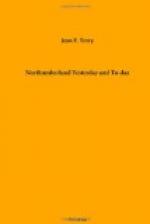Redwald’s friendship, however, does not seem to have been above suspicion, for we find that Ethelfrith’s bribe had on one occasion nearly induced him to give up his guest, whose life, however, was saved by Redwald’s wife who turned her husband from his purpose. In his exile the thoughts of the young prince often turned towards his own land; and, once, as he sat brooding over his misfortunes, he saw in a vision one who came and spoke comforting words to him, saying that he should yet be king and that his reign should be long and glorious. “And if one should come to thee and repeat this sign,” said the stranger, laying his right hand on Edwin’s head “wouldst thou hearken to his rede?” Edwin gave his word, and the vision fled. Some little time after this, Ethelfrith of Northumbria, as the united districts were now called, fell in battle against Redwald, and Edwin, returning northward, became ruler of Northumbria, the sons of Ethelfrith fleeing in their turn before the new king. Edwin wedded, as his second wife, Ethelburga, daughter of that king of Kent in whose days Augustine came to England; and being a Christian princess, she brought with her a priest to her new home in the north. The priest’s name was Paulinus; and one day he went to the King and, placing his right hand on Edwin’s head, asked if he knew that sign. Edwin remembered, and redeemed his promise. He hearkened to the teaching of the earnest monk, with the result that before long he and his court were baptised by Paulinus, Edwin’s little daughter, it is said, being the first to receive the sacred rite.
This was at York; and when the king and queen went to the royal city of Bamburgh, or to their country dwelling at the foot of the Cheviots, Paulinus accompanied them; and wherever he went, he laboured to teach the North-country Angles and Saxons the gospel of Christ. This country dwelling, to which came Paulinus and his royal friends, was Ad-gefrin, or Yeavering; and though it is extremely unlikely that any traces of it could remain until our day, yet tradition points out a fragment of an old building still standing there, as a remnant of the royal residence.
In the region of Kirknewton, a pretty little village to the north-west of Yeavering, where Colledge Water joins the Glen, which gives its name to the romantic district of Glendale, Paulinus baptised many hundreds of Edwin’s people; and the name of Pallinsburn—which is now confined to a house at some little distance from the burn—enshrines the memory of yet another scene of the labours of the indefatigable monk.
If we stand on the wind-swept top of Yeavering Bell, we are surrounded by the evidences of still more remote days, for the whole of the summit was once a fortified camp of the ancient Britons. A roughly-piled, but massive wall, now almost all broken down, surrounded it, and within its grass-grown oval are two additional walls, at the east and the west ends of the enclosure, and many hut-circles, evidences of the rude dwellings




